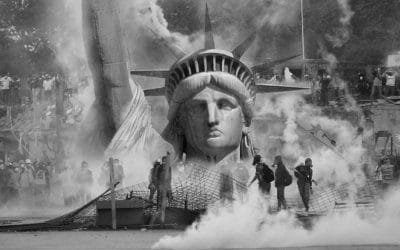President Bush is in Russia to participate (wrongly) in Monday’s Red Square celebration of the 60th anniversary of the defeat of the Nazis.
The good news is that Bush just made an anti-Soviet speech in Latvia. As the NY Times reported on Sunday, Bush “had said only the day before in a speech in Latvia that the Nazi defeat gave the Soviet Union the opportunity to occupy much of Eastern and Central Europe, including Latvia…”
The Times reporting, naturally, is all focused on how Bush’s remarks will “anger” the Russians–which I hope it does. And it formulates this “anger” not as coming from Putin and his henchmen but from the Russian people. Given the freedom-fearing philosophy of the Russian people, this is probably true, but the Times is clearly against Bush having pointed out such things as:
“Stable, prosperous democracies are good neighbors, trading in freedom and posing no threat to anyone.”
And:
“All free and successful countries have some common characteristics–freedom of worship, freedom of the press, economic liberty, the rule of law and the limitation of power through checks and balances.”
Putin, however, played off the equivocation between “democracy” (i.e., dictatorship of the majority) and a “republic” (in which the majority cannot vote away the rights of the individual). Putin had the nerve to say on “60 Minutes” that Bush’s 2000 re-election was not “democratic” because the decisive Florida vote was validated by the Supreme Court.
In the Times’ slanted description, Putin said “that Mr. Bush had little business lecturing him about democracy when the 2000 presidential election in the United States was decided by the Supreme Court.”
Here, Putin joins with the Religious Right in holding that the courts are wrong when they “undemocratically” hold back the will of the mob. It makes sense for the Religious Right to end up in bed with Putin: both are statists.
Bush also said in Latvia: “For much of Germany, defeat led to freedom. [I.e., for West Germany, as opposed to East Germany.] For much of Eastern and Central Europe, victory brought the iron rule of another empire. V-E Day marked the end of fascism, but not the end of oppression.”
This is to the good, and it needed saying. But it should have unevasively named that oppressive empire: Soviet communism, and concretized their oppression by at least naming East Germany, Poland, Hungary, Romania, Bulgaria, Czechoslovakia, Albania, Estonia, Lativa, and Lituania.
Immediately following this quote from Bush, the Times turns to the subject of “anger”: “The Russians have been angered by Mr. Bush’s trip to Latvia …” And the next paragraph begins,
“Mr. Bush on Saturday [in Latvia] seemed likely to anger the Russians even more [Oh, no! Not that!], because he repeatedly used the word “occupation” to describe the Russian acts in the Baltics–Latvia, Lithuania and Estonia–after World War II. The Russians have furiously responded that they were invited in.”
Well, if they are “furious,” who are we to consider the truth of the matter? Facts are irrelevant when other people are furious at us. Every Peter Keating knows that by direct introspection.
But the Times is decent enough, after having made this appeal to second-handerism, to give us some facts, however sugar-coated (did an editor insist on adding them?):
“The Soviet Union and Nazi Germany signed a nonaggression pact in August 1939, just weeks before Germany’s invasion of Poland precipitated World War II [Wait! Germany claimed “they were invited in”!] Soviet troops joined German forces in occupying Poland, and the next year the Soviet Union also entered Latvia, Lithuania and Estonia and incorporated them into the Soviet Union as republics.”
You get the difference, right? Bush says that the Soviets “occupied” the Baltic countries. The Times says the Soviets “entered” them and “incorporated them.” And they incorporated them not as “republics” (with scare quotes) but as republics (without scare quotes).
Note that the Soviets knew the difference between a republic and a democracy, and sought to gain the (then) prestige of the idea of a constitutionally limited republic. Oh yes, the Soviets did have a constitution–one permitting the citizens full freedom to do whatever they chose … so long as it wasn’t against “state policy.”
In another good moment, Bush criticized the former U.S. policy of appeasement. Referring to such things as the 1945 agreement at Yalta between Stalin, FDR, and Churchill, Bush said: “once again, when powerful governments negotiated, the freedom of small nations was somehow expendable … [the] captivity of millions in Central and Eastern Europe will be remembered as one of the greatest wrongs of history.”
Amen. And he went on to apply it to our policy toward the Arabs today: “we will not repeat the mistakes of other generations appeasing or excusing tyranny, and sacrificing freedom in the vain pursuit of stability.”
But for every good speech writer Bush has, there is another, bad one. And on Sunday in Moscow he said:
“I am looking forward to the celebration tomorrow. It is a moment where the world will recognize the great bravery and sacrifice the Russian people made in the defeat of Nazism.”
I wonder whether that “great bravery and sacrifice” includes the several hundred thousand Russians, under Lieut. Gen. Vlasov, who, according to the Glossary of Solzhenitsyn’s Gulag Archipelago, “led Russian forces against Soviet Union; handed over by Allies after war and executed”? Vlasov and those who followed him, plus many more who sympathized, regarded the Nazis as less evil than the Soviets.
Yet tomorrow Bush is celebrating Stalin’s victory over the Nazis. And this at a time when statues to Stalin are beginning to reappear in cities across Russia, with Putin’s blessing.



